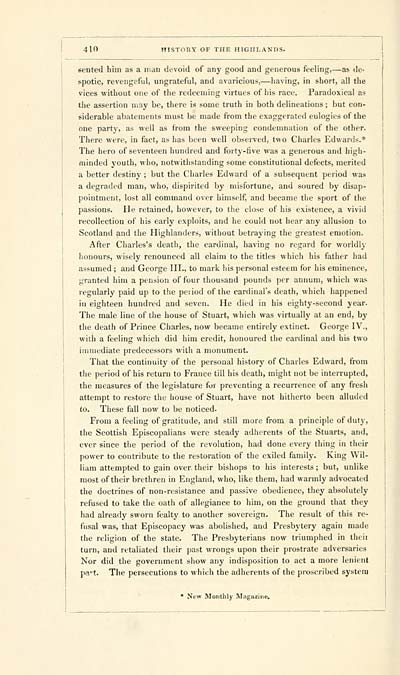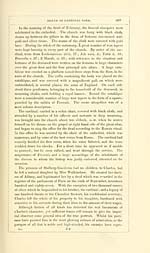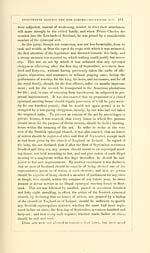Download files
Complete book:
Individual page:
Thumbnail gallery: Grid view | List view

4l0 HISTORY OF THE HIGHLANDS.
sented him as a man devoid of any good and generous feeling, — a& de-
spotic, revengeful, ungrateful, and avaricious, — having, in short, all the
vices without one of the redeeming virtues of his race. Paradoxical a^
the assertion may be, there is some truth in both delineations ; but con-
siderable abatenierus must be made from the exaggerated eulogies of the
one party, as well as from the sweeping condemnation of the other.
There were, in fact, as has been well observed, two Charles Ed« ards.*
The hero of seventeen hundred and forty-five was a generous and higli-
minded youth, who, notwithstanding some constitutional defects, merited
a better destiny ; but the Charles Edward of a subsequent period was
a degraded man, who, dispirited by misfortune, and soured by disap-
pointment, lost all command over himself, and became the sport of the
passions. He retained, however, to the close of his existence, a vivid
recollection of his early exploits, and he could not hear any allusion to
Scotland and the Highlanders, without betraying the greatest emotion.
After Charles's death, the cardinal, having no regard for worldly
honours, wisely renounced all claim to the titles which his father had
assumed ; and George HI., to mark his personal esteem for his eminence,
granted him a pension of four thousand pounds per annum, which was
regularly paid up to the peiiod of the cardinal's death, which happened
in eighteen hundred and seven. He died in his eighty-second year.
The male line of the house of Stuart, which was virtually at an end, by
the death of Prince Charles, now became entirely extinct. George IV.,
witii a feeling which did him credit, honoured the cardinal and his two
immediate predecessors with a monument.
That the continuity of the personal history of Charles Edward, from
the period of his return to Frauce till his death, might not be interrupted,
the measures of the legislature for preventing a recurrence of any fresh
attempt to restore the house of Stuart, have not hitherto been alluded
to. These fall now to be noticed.
From a feeling of gratitude, and still more from a principle of duty,
the Scottish Episcopalians were steady adherents of the Stuarts, and,
ever since the period of the revolution, had done every thing in their
power to contribute to the restoration of the exiled family. King Wil-
liam attempted to gain over their bishops to his interests ; but, unlike
most of their brethren in England, who, like them, had warmly advocated
the doctrines of non-resistance and passive obedience, they absolutely
refused to take the oath of allegiance to him, on the ground that they
had already sworn fealty to another sovereign. The result of this re-
fusal was, that Episcopacy was abolished, and Presbytery again made
the religion of the state. The Presbyterians now triumphed in theii
turn, and retaliated their past wrongs upon their prostrate adversaries
Nor did the government show any indisposition to act a more lenient
pa-t. Tlie persecutions to which the adherents of the proscribed system
* New Monthly Magazine.
sented him as a man devoid of any good and generous feeling, — a& de-
spotic, revengeful, ungrateful, and avaricious, — having, in short, all the
vices without one of the redeeming virtues of his race. Paradoxical a^
the assertion may be, there is some truth in both delineations ; but con-
siderable abatenierus must be made from the exaggerated eulogies of the
one party, as well as from the sweeping condemnation of the other.
There were, in fact, as has been well observed, two Charles Ed« ards.*
The hero of seventeen hundred and forty-five was a generous and higli-
minded youth, who, notwithstanding some constitutional defects, merited
a better destiny ; but the Charles Edward of a subsequent period was
a degraded man, who, dispirited by misfortune, and soured by disap-
pointment, lost all command over himself, and became the sport of the
passions. He retained, however, to the close of his existence, a vivid
recollection of his early exploits, and he could not hear any allusion to
Scotland and the Highlanders, without betraying the greatest emotion.
After Charles's death, the cardinal, having no regard for worldly
honours, wisely renounced all claim to the titles which his father had
assumed ; and George HI., to mark his personal esteem for his eminence,
granted him a pension of four thousand pounds per annum, which was
regularly paid up to the peiiod of the cardinal's death, which happened
in eighteen hundred and seven. He died in his eighty-second year.
The male line of the house of Stuart, which was virtually at an end, by
the death of Prince Charles, now became entirely extinct. George IV.,
witii a feeling which did him credit, honoured the cardinal and his two
immediate predecessors with a monument.
That the continuity of the personal history of Charles Edward, from
the period of his return to Frauce till his death, might not be interrupted,
the measures of the legislature for preventing a recurrence of any fresh
attempt to restore the house of Stuart, have not hitherto been alluded
to. These fall now to be noticed.
From a feeling of gratitude, and still more from a principle of duty,
the Scottish Episcopalians were steady adherents of the Stuarts, and,
ever since the period of the revolution, had done every thing in their
power to contribute to the restoration of the exiled family. King Wil-
liam attempted to gain over their bishops to his interests ; but, unlike
most of their brethren in England, who, like them, had warmly advocated
the doctrines of non-resistance and passive obedience, they absolutely
refused to take the oath of allegiance to him, on the ground that they
had already sworn fealty to another sovereign. The result of this re-
fusal was, that Episcopacy was abolished, and Presbytery again made
the religion of the state. The Presbyterians now triumphed in theii
turn, and retaliated their past wrongs upon their prostrate adversaries
Nor did the government show any indisposition to act a more lenient
pa-t. Tlie persecutions to which the adherents of the proscribed system
* New Monthly Magazine.
Set display mode to: Large image | Transcription
Images and transcriptions on this page, including medium image downloads, may be used under the Creative Commons Attribution 4.0 International Licence unless otherwise stated. ![]()
| Early Gaelic Book Collections > Ossian Collection > History of the Highlands and of the Highland clans > Volume 3 > (456) |
|---|
| Permanent URL | https://digital.nls.uk/79657894 |
|---|
| Description | Vol. III. |
|---|---|
| Shelfmark | Oss.249 |
| Attribution and copyright: |
|
| Description | Selected books from the Ossian Collection of 327 volumes, originally assembled by J. Norman Methven of Perth. Different editions and translations of James MacPherson's epic poem 'Ossian', some with a map of the 'Kingdom of Connor'. Also secondary material relating to Ossianic poetry and the Ossian controversy. |
|---|
| Description | Selected items from five 'Special and Named Printed Collections'. Includes books in Gaelic and other Celtic languages, works about the Gaels, their languages, literature, culture and history. |
|---|

